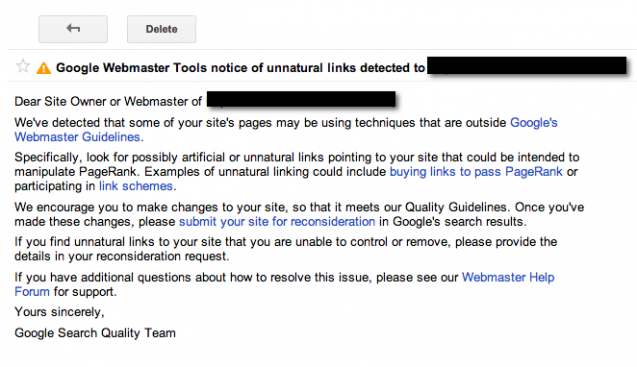A Google penalty will result in a negative impact to your search engine rankings and traffic. Depending on the severity of the penalty, you may lose a little, a lot or even all of your organic traffic.
IMPACT OF A GOOGLE PENALTY
Getting hit by a Google penalty can be disastrous for your business. When ebay got hit by a Google penalty, they reportedly lost US$200 million in revenue. For smaller businesses, a Google penalty may cause their phones to stop ringing and shut them down.
Furthermore, a Google penalty can be very hard to get out of.
You cannot just give Google a call to beg your way out of it. Just because we are an SEO company doesn’t mean that we have a special hotline to Google that we can use to get you out of the hot soup you’re in.
It’s going to take a lot of work and time.
Some penalties, such as the previous iterations of Google’s Penguin penalty, can be so tricky to get out of that one of the first questions we used to ask clients was, “Do you still need this domain?”. This is because you may get better returns focusing on a new domain instead of trying to come out of a penalty.
In most cases, especially if you’re a larger brand, then changing your domain is out of the question. If that’s the case, then we had to find out which penalty you have been hit with, execute the necessary remedial actions and then request (beg) Google to reconsider the penalty. Fun times.
These days, Google’s Penguin no longer dishes out sitewide ranking penalties. But that doesn’t mean that we no longer have to worry about getting penalised.
What we’re trying to say is, please follow Google’s Webmaster Guidelines and try not to get hit by a penalty.
DETECTING A GOOGLE PENALTY
The first step is to determine if you have indeed been slapped with a penalty.
For all we know, you may not have been hit by a penalty at all and could just be a routine change in Google’s algorithm, market changes, competitors ramping up their SEO spending or a myriad of other factors.
There are two types of Google penalties you should be aware of – manual penalties and algorithmic penalties.
You don’t have to guess if you have been hit by a manual penalty since Google will send you a notification in your Search Console account.
An algorithmic penalty can be harder to detect. You have to look at your Google Analytics account and determine if there has been a sudden drop in traffic.
MANUAL GOOGLE PENALTY
Most of the time, you know you’ve been hit by a manual penalty when you receive a notification in your Google Search Console that looks something like this:

The good thing about a manual action is that at least Google will let you know that something is wrong with your website, which allows us to take action faster. When you get an email like this, be prepared for a rankings dive or deindexation.
Google executes a manual action on over 400,000 websites every month.
These are the usual reasons a website will receive a manual penalty.
- Unnatural Links to Your Site
- Hacked Site
- Thin Content
- Pure Spam
- User-Generated Spam
- Cloaking and Sneaky Redirects
- Hidden Text and Keyword Stuffing
- Spammy Freehosts
- Spammy Structured Markup
In these cases, Google will inform us which of the manual actions it has placed on your website and we can take the necessary actions.
ALGORITHMIC GOOGLE PENALTY
Google’s algorithmic penalties are much harder to detect. These are not accompanied by any polite notifications in your Search Console account.
In the past, Google’s Penguin and Panda penalties ran as filters on top of the core search algorithm. These filters were executed at various intervals and the roll out could have taken months.
The good thing about this is that you would know if you were hit by either Penguin or Panda.
Now that they have been incorporated into the main algorithm, it’s harder to detect
However, the nature of these algorithms have also changed.
Penguin no longer penalises websites and Google has said that they don’t no longer see Panda as a penalty per se.
Instead, it looks at the site as a whole, determines the quality of the site and if it’s found wanting, it will demote its rankings. It does not have the ability to promote the site though.
So in terms of algorithmic penalties, you may still need to watch out for Top Heavy, Pirate and other penalties that may have caused your site to dip in the SERPs.
